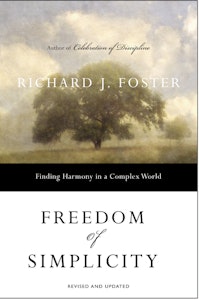 Excerpt from Freedom of Simplicity
Excerpt from Freedom of Simplicity
The most radiant passage on Christian simplicity in all the Bible must be Matthew 6. It simply sparkles with joy and trust. Earlier, Jesus announced that the kingdom of God had burst upon the human scene. Hence we can live in a new, glorious inner liberty of alms-giving, praying, and fasting without any need for human approval. We can obey the trenchant command, “Do not lay up for yourselves treasures on earth” (Matt. 6:19). We can live lives focused upon stockpiling “treasures in heaven” (Matt. 6:20). We can be scandalously free from anxiety, because we are under the watchful eye of him who richly cares for the birds of the air and the lilies of the field. No longer do we need to bear on our backs the soul-crushing gentile burden of the world of tomorrow. With focused eye and centered heart we can freely “seek first his kingdom and his righteousness,” knowing that all things needful will be provided (Matt. 6:33).
Jesus teaches us with a negative and a positive command: “Do not lay up for yourselves treasures on earth,” but do “lay up for yourselves treasures in heaven” (Matt. 6:19). The “treasures” in view here are not just great riches, but all those things that we trust in and cling to. My boys, for example, when they were young, had some very special treasures. When I looked into what those objects were, I was frequently amazed, for they may have been only some shiny stones, or an odd-looking stick, or a pile of rubber bands. But for my children these were coveted treasures. Jesus is warning us that, no matter what our earthly treasures may be, we have to be very careful about holding too tightly to them, because they are bound to disappoint us and to keep us from living in the kingdom of God in the freedom and power we desire. He knows that we have an almost compulsive need to secure ourselves by means of earthly things but tells us not to do that, and proceeds to give three reasons why we should not amass earthly treasure but should store up heavenly treasure.
The first reason is that this world is a very uncertain place (Matt. 6:19 — 20). There simply is “no hidin’ place down here.” Now, these days we may not have a problem with moths and rust corrupting our treasure, but it is certainly difficult to find a situation where inflation does not “break in and steal” it. Jesus is forcing us to see that, regardless of how secure our treasure may be, it will ultimately fail us.
The second reason Jesus points to is the fact that whatever we fix as our treasure will take over our whole life: “For where your treasure is, there will your heart be also” (Matt. 6:21). He was not saying that the heart should or should not be where the treasure is, but that it will be.
There is no option in this matter: our whole mind will be fixed around our treasure. When Jesus said that “no one can serve two masters,” he did not mean that it was unwise to serve two masters, but that it was impossible. If our treasure is in our bank account, or an educational diploma, or any other earthly thing, our mind will not be on God.
Jesus illustrates this fact in the most profound way: “The light of the body is the eye: if therefore thine eye be single, thy whole body shall be full of light” (Matt. 6:22, KJV). If all within us is honed down to the single treasure of Christ and his kingdom, then we are living in the light of simplicity.
The ancient term “single eye” has a rich connotation that our English has difficulty capturing. It refers both to a single aim in life and to a generous, unselfish spirit. The two ideas have such a close connection in the Hebrew mind that they can be expressed in a single phrase. Singleness of purpose toward God and generosity of spirit are twins. The single eye is contrasted with the “evil eye,” which is a Semitic expression for a covetous nature.2
Jesus lived in this singleness of purpose with God so perfectly that he could say without embellishment that he did nothing of his own accord (John 5:19). His words were the words of the Father; his deeds, the deeds of the Father. And, astonishingly, he calls us in our own small way to enter this unity of purpose. He invites us to the life of the “single eye” through which the entire personality is bathed in light and unity. With our eye focused on Christ the Center, we are to live with glad and generous hearts. This is simplicity.
The third reason Jesus gives for not laying up treasure on earth is that provision has already been made. The birds of the air and the lilies of the field all witness to an order in the kingdom of God, in which adequate provision is made for everyone and everything. God provides for us according to our needs, just as he does for the plant and the animal life.
Jesus is not telling us to refrain from making provision. We miss the point of the teaching if, when the family gathers for supper, we announce, “Now, the Bible says to take no thought for supper, and so we haven’t.” No, we work, but we work in faith, not in the anxious concern of distrust. On a practical level it is at this point that the nagging problem of “faith versus works” is resolved. We live centered in trust and faith, and all our action and work arises out of that center. It is not fear and anxiety over tomorrow that prompt us to work, but obedience to the divine command. We make provision as it seems right and good (just as the birds do), but what comes to us is not so much the result of our labor as it is the gracious gift of God. We live the carefree life of unconcern for possessions in the midst of our work.
When this spirit of trust pervades all of our efforts, we understand the unwisdom of borrowing evil from tomorrow. No longer distracted by concerns for tomorrow, we seek first Christ’s kingdom and his righteousness. The focus of our thought, speech, and action is Christ the Center.
Excerpted from Freedom of Simplicity: Finding Harmony in a Complex World by Richard Foster (Grand Rapids: Zondervan, 2005), pp. 40 – 43.
Photo by Samuel Lopes on Unsplash
· Last Featured on Renovare.org August 2023


